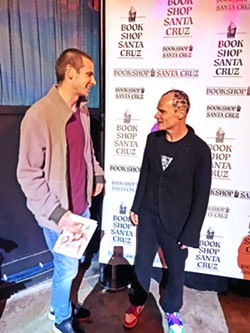There's a particular Red Hot Chili Peppers song lyric that has always stuck in my mind as the perfect encapsulation of the story and spirit of maybe the rock band of my lifetime (and my favorite growing up). And no, it's not "suck my kiss," or "give it away," or "under the bridge downtown."
It's from one of the band's lesser known tunes, "Don't Forget Me," off the epiphanic By the Way (2002), in which a newly sober and more spiritually in-tune Anthony Kiedis sings, "There's a love that knows the way."
I think it's fitting because the Chili Peppers—through their obscure beginnings in the '80s as a wild LA punk/funk act, through the loss of their founding guitarist to an overdose, through creative droughts, more drug addictions, and titanic shifts in the music industry—persevered and ultimately built their legacy on the bedrocks of love, brotherhood, and creative conviction. That foundation underlies the music, the inimitable bass grooves, the virtuosic guitar playing, the organic-sounding melodies and wordplay, giving it a universal and deep feeling.

- Photo Courtesy Of Peter Johnson
- MEET AND GREET Flea took photos with hundreds of fans after his talk at the Rio Theatre in Santa Cruz on Nov. 19, including yours truly.
That line enters my mind once again on Nov. 19, as I sit amongst a sold-out crowd in the Rio Theatre in Santa Cruz watching Chili Peppers bassist Flea talk about the trials and tribulations of his childhood as an unwatched "street kid" in 1970s Hollywood—an upbringing he describes in painful and beautiful detail in his terrific new memoir, Acid for the Children.
"No matter what happened," Flea says about the ups and downs of his youth, "I felt this thing inside of me. Like a light, a real powerful love. Whenever I strayed away from it, things got bad. I did bad shit. But when I followed it, great things happened, always."
Flea is in conversation with Santa Cruz Good Times Editor Steve Palopoli (community weekly pride!) on the last stop of his nationwide book tour. With a cheetah-spotted haircut, a loose-hanging black blazer, and two different colored shoes, the 57-year-old sounds a little tired but is wholly engaged in the discussion, his eyes welling up with emotion at various points along the talk.
"I knew I was going in, and I was going in deep," he says about the process of writing the memoir. "A lot of it was very painful."
In the early '80s, Flea co-founded the Red Hot Chili Peppers with Kiedis, his high school best friend (the north magnet to his south magnet, he says). But his memoir actually ends just after the band forms. Flea's writing instead focuses on his childhood and early adulthood experiences, a decision he says was intended to eschew rock star autobiography convention.
While that premise may sound disappointing, Acid for the Children is completely the opposite. The book is alive, authentic, heart-breaking, and uplifting, all at once. It's incredibly engaging and relatable, yet clearly a one-of-a-kind story. Writing the book himself (with no ghostwriter), Flea uses prose that's both simple and colorful, powerful and vulnerable, humorous and tragic, the mosaic of short chapters chock-full of fascinating stories and nakedly honest insights. In other words, it's something only Flea could write.
Born as Michael Balzary in Melbourne, Australia, Flea came to the U.S. at an early age when his dad, an Australian customs official, took a job at the New York consulate. His mom, fed up with a stifling housewife life, soon left him for her piano teacher, Walter, a jazz musician with a tortured soul. Mom, Flea, and his sister moved into Walter's parents' home—into their basement—while the dismayed dad returned to Australia. Flea and the family then moved to LA when he was about 10.
Though traumatized by the family upheaval and his stepdad's ongoing substance abuse issues, Flea says it was Walter who introduced him to music; he regularly hosted his jazz friends at the house for jam sessions.
"I was just absolutely leveled," Flea tells us about hearing live jazz at home for the first time. "I just threw myself on the floor and I was laughing and yelling. ... The music was throwing me around on the floor." He follows with a quintessentially Flea analogy: "If we all levitated right now and flew off together and gave high-fives 300 feet in the air, it would not be more magical than the way that was to me."
An outcast at school without present parents at home, Flea looked to his friends for a sense of family. He met Kiedis in freshman year of high school, a fellow misfit with an equal penchant for being wild and getting in trouble. They were inseparable and soon formed a brotherhood with Hillel Slovak, the Chili Peppers' founding guitar player. Flea played jazz trumpet in school, but when Slovak asked him to join his high school rock band as a bassist, Flea dropped everything to learn the four-stringed instrument. He didn't even like rock music until then. The rest, as they say, is history. While the Chili Peppers wouldn't form for another several years, the founding members' deep relationships, born out of shared pain from volatile upbringings, cemented their destiny.
"It was difficult, but it was the perfect fertile ground to be in a band because when we started the band our connections were very deep," Flea says. "A band ... for it to really connect with people's hearts in a universal way over a long period of time and have it be real, it's only going to be inverse and of equal proportion to the love between the members of the band themselves."
After an hour of conversation, Palopoli ends the talk. We then find out over the theater loudspeaker that Flea will be taking photos with each of the hundreds of audience members after, and I'm one of the first groups to get the chance. Not sure what to say, I simply smile and wish him congratulations on his book and that I can't wait to read it. He sizes me up (I'm almost a foot taller than him), flashes a big smile, warmly says thank you, and we take a photo.
Driving home, the lyric enters my mind again: "There's a love that knows the way." It's a simple line, but I believe in it. I believe in Flea and that band, too.
"Our stories are so important, all of them. I don't think mine's special or anything like that," Flea said to end his talk. "In the times we're living in now ... there's a great, great divide in this country. Way more than one side being right and the other being wrong, we need to share our stories. We need to connect. We need to come together." Δ
Assistant Editor Peter Johnson is not under the bridge downtown. He can be reached at [email protected].

Comments